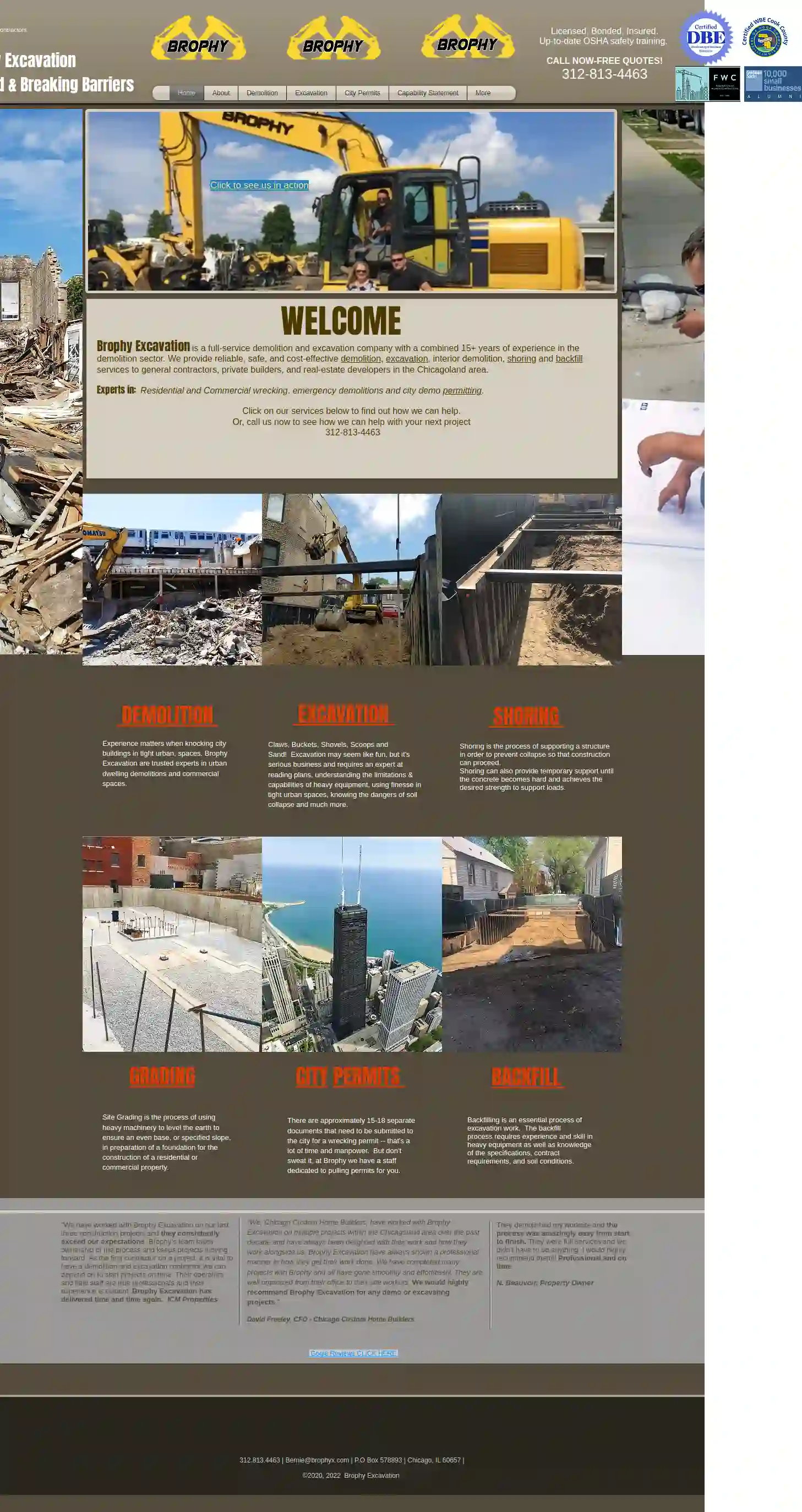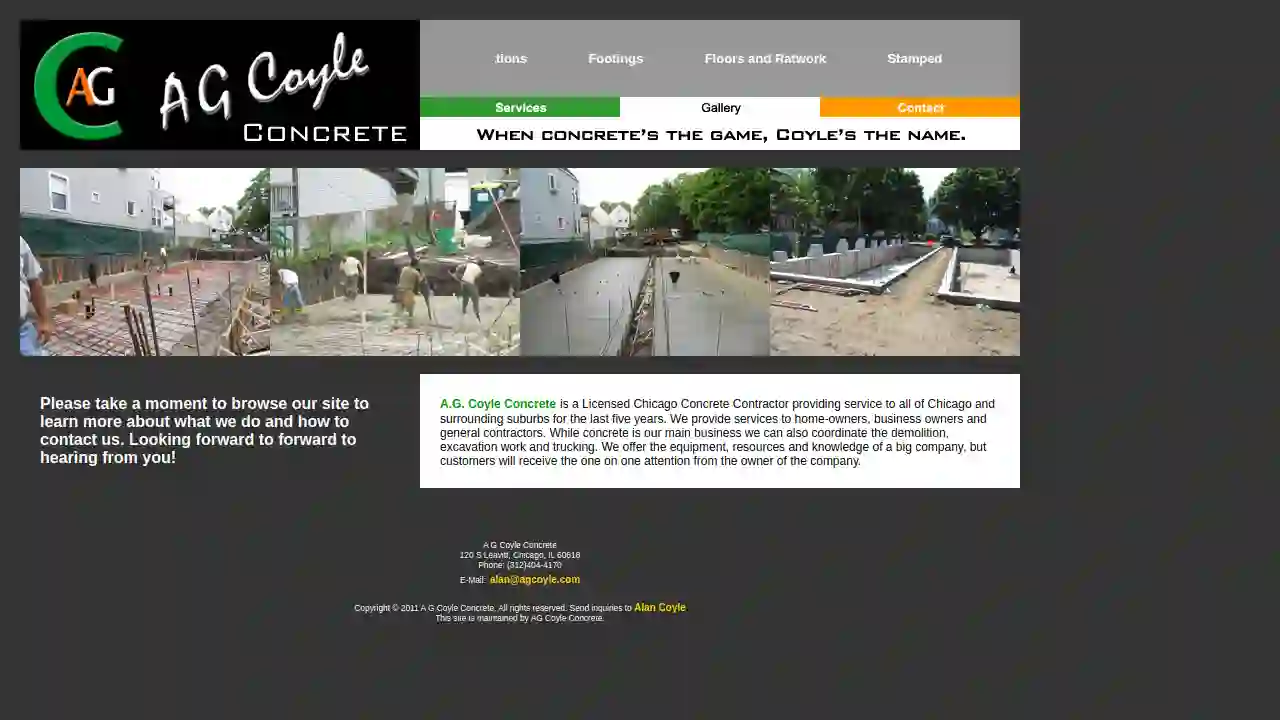Excavation Contractors Round Lake Beach
Top Excavation Company Near Me in Round Lake Beach
Receive up to 3 Excavation Contractors quotes for your project today! Compare profiles, reviews, accreditations, portfolio, etc... and choose the best deal.
- Je
Jeremy Hiltz Excavating Inc
371 reviewsAlton, US- Services
- Why Us?
Get Quote 
Brophy Excavation-Demolition
4.86 reviewsP.O Box 578893, Chicago, 60657, USBrophy Excavation: Your Trusted Partner for Demolition and Excavation in Chicago Brophy Excavation is a full-service demolition and excavation company with over 15 years of experience in the Chicagoland area. We provide reliable, safe, and cost-effective services to general contractors, private builders, and real estate developers. Our team of experts is dedicated to delivering exceptional results on every project, no matter how big or small. We specialize in: Residential and Commercial Wrecking Emergency Demolitions City Demo Permitting Excavation Shoring Grading Backfill At Brophy Excavation, we understand the importance of safety and efficiency. We are fully licensed, bonded, and insured, and our team is up-to-date on all OSHA safety training. We are committed to providing our clients with the highest level of service and professionalism. Contact us today for a free quote and let us help you with your next project.
- Services
- Why Us?
- Testimonials
- Gallery
Get Quote
AG Coyle Concrete
1120 S Leavitt, Chicago, 60618, USA.G. Coyle Concrete: Your Trusted Chicago Concrete Contractor A.G. Coyle Concrete is a licensed and experienced Chicago concrete contractor serving the city and its surrounding suburbs for the past five years. We are dedicated to providing top-notch concrete services to homeowners, business owners, and general contractors alike. While concrete is our core expertise, we also offer a comprehensive range of services, including demolition, excavation, and trucking. We bring the resources and knowledge of a larger company, but with the personalized attention you'd expect from a family-owned business.
- Services
- Why Us?
- Gallery
Get Quote
4 Seasons Excavation
51 reviewsAuburn, New Hampshire, United States, USDig Deep, Build Strong Your trusted excavating contractor for all your residential and commercial needs. About 4 Seasons Excavation 4 Seasons Excavation is a team of excavation contractors who specialize in a variety of excavation services, including land clearing, grading, and excavation for new construction. Our team has the knowledge and expertise to ensure that every project is completed safely, on time, and within budget. Our Approach At 4 Seasons Excavation, we take a collaborative approach to every project. We work closely with our clients to ensure that their needs and goals are met, and we communicate clearly and transparently throughout the entire process. We believe that this approach leads to better outcomes and more satisfied customers.
- Services
- Why Us?
- Gallery
Get Quote- Gr
Grand Avenue Demolition
1Chicago, US- Services
- Why Us?
Get Quote - Ve
Veary Septic & Site
56 reviewsAlton, US- Services
- Why Us?
Get Quote - Hu
Huntoon Excavation LLC
3.73 reviewsAlton, US- Services
- Why Us?
Get Quote - Mu
Mueth Excavation
1Chicago, US- Services
- Why Us?
Get Quote - Sa
Sawin Excavation
51 reviewsAlton, US- Services
- Why Us?
Get Quote - Sb
Sbuss Excavation
12 reviewsAlton, US- Services
- Why Us?
Get Quote
Over 21,512+ Excavation Contractors registered
Our excavation companies operate in Round Lake Beach & beyond!
ExcavationHQ has curated and vetted the Best Excavation Companies in Round Lake Beach. Find a top & reliable contractor today.
Frequently Asked Questions About Excavation Contractors
- Trench Collapses: Unstable trench walls can cave in, posing a severe risk to workers. Proper shoring and sloping are crucial safety measures.
- Utility Damage: Striking underground utilities (gas, water, electric) can cause leaks, explosions, or electrocution. Accurate utility locates and careful digging are essential.
- Falling Objects: Materials or equipment falling into excavations can injure workers. Securing work areas and using appropriate safety gear is vital.
- Equipment Accidents: Operating heavy machinery involves risks of rollovers, collisions, or mechanical failures. Trained operators and proper equipment maintenance are critical.
- Environmental Hazards: Excavated soil might contain hazardous materials (asbestos, lead). Proper testing and disposal procedures are necessary.
- Basement Size: The larger the basement, the more excavation is required, increasing the cost.
- Soil Type: Excavating rocky or dense clay soil is generally more expensive than loose soil.
- Accessibility: Difficult-to-access sites might require specialized equipment or more labor, driving up costs.
- Foundation Type: The chosen foundation type (full basement, crawl space, slab) affects excavation needs.
- Underpinning: If underpinning (strengthening existing foundations) is necessary, it significantly increases costs.
- Disposal Fees: Hauling excavated soil to disposal sites adds to the overall expense.
- Project Size and Scope: The larger and more complex the excavation, the higher the cost.
- Soil Type: Different soil types require different equipment and techniques, impacting costs. Rocky or clay-rich soil can be more expensive to excavate than loose soil.
- Accessibility: Difficult-to-access sites might require specialized equipment or additional labor, increasing expenses.
- Disposal Costs: Hauling away excavated material (soil, rocks, etc.) to disposal sites incurs additional fees.
- Permits and Inspections: Depending on local regulations, permits and inspections might be required, adding to the overall cost.
- Mechanical Excavation: Utilizing heavy equipment like excavators, backhoes, bulldozers, and loaders, suitable for most projects.
- Hand Excavation: Using hand tools (shovels, picks) for smaller excavations or delicate work near utilities.
- Blasting: Employing explosives to break up rock or hard materials, typically for large-scale projects.
- Hydro Excavation: Using high-pressure water jets to loosen and remove soil, often used for locating utilities or delicate excavation.
- Vacuum Excavation: Employing a vacuum system to suck up excavated material, suitable for safe excavation near utilities or in confined spaces.
What are the risks associated with excavation?
How much does it cost to excavate a basement?
How much does excavation cost?
What are the different methods of excavation?
What are the risks associated with excavation?
- Trench Collapses: Unstable trench walls can cave in, posing a severe risk to workers. Proper shoring and sloping are crucial safety measures.
- Utility Damage: Striking underground utilities (gas, water, electric) can cause leaks, explosions, or electrocution. Accurate utility locates and careful digging are essential.
- Falling Objects: Materials or equipment falling into excavations can injure workers. Securing work areas and using appropriate safety gear is vital.
- Equipment Accidents: Operating heavy machinery involves risks of rollovers, collisions, or mechanical failures. Trained operators and proper equipment maintenance are critical.
- Environmental Hazards: Excavated soil might contain hazardous materials (asbestos, lead). Proper testing and disposal procedures are necessary.
How much does it cost to excavate a basement?
- Basement Size: The larger the basement, the more excavation is required, increasing the cost.
- Soil Type: Excavating rocky or dense clay soil is generally more expensive than loose soil.
- Accessibility: Difficult-to-access sites might require specialized equipment or more labor, driving up costs.
- Foundation Type: The chosen foundation type (full basement, crawl space, slab) affects excavation needs.
- Underpinning: If underpinning (strengthening existing foundations) is necessary, it significantly increases costs.
- Disposal Fees: Hauling excavated soil to disposal sites adds to the overall expense.
How much does excavation cost?
- Project Size and Scope: The larger and more complex the excavation, the higher the cost.
- Soil Type: Different soil types require different equipment and techniques, impacting costs. Rocky or clay-rich soil can be more expensive to excavate than loose soil.
- Accessibility: Difficult-to-access sites might require specialized equipment or additional labor, increasing expenses.
- Disposal Costs: Hauling away excavated material (soil, rocks, etc.) to disposal sites incurs additional fees.
- Permits and Inspections: Depending on local regulations, permits and inspections might be required, adding to the overall cost.
What are the different methods of excavation?
- Mechanical Excavation: Utilizing heavy equipment like excavators, backhoes, bulldozers, and loaders, suitable for most projects.
- Hand Excavation: Using hand tools (shovels, picks) for smaller excavations or delicate work near utilities.
- Blasting: Employing explosives to break up rock or hard materials, typically for large-scale projects.
- Hydro Excavation: Using high-pressure water jets to loosen and remove soil, often used for locating utilities or delicate excavation.
- Vacuum Excavation: Employing a vacuum system to suck up excavated material, suitable for safe excavation near utilities or in confined spaces.